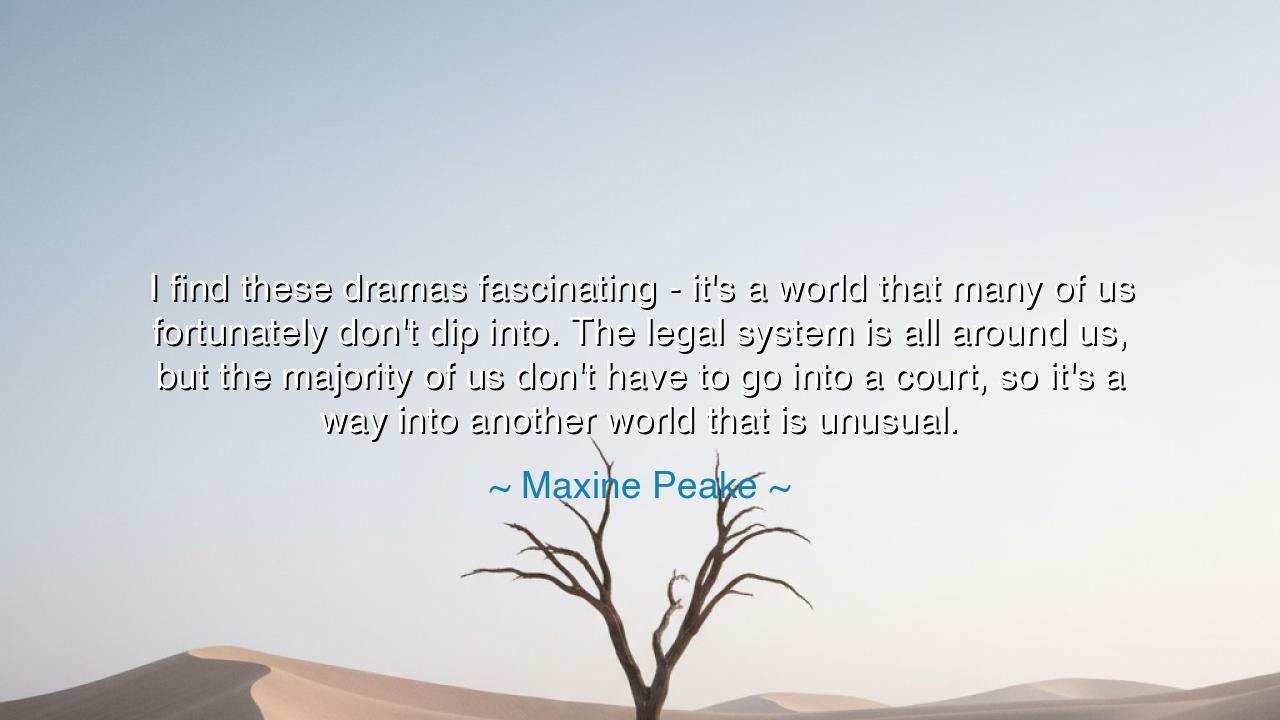
I find these dramas fascinating - it's a world that many of us
I find these dramas fascinating - it's a world that many of us fortunately don't dip into. The legal system is all around us, but the majority of us don't have to go into a court, so it's a way into another world that is unusual.






The words of Maxine Peake shimmer with curiosity and quiet reverence: “I find these dramas fascinating – it's a world that many of us fortunately don't dip into. The legal system is all around us, but the majority of us don't have to go into a court, so it's a way into another world that is unusual.” In her reflection lies a truth both simple and profound — that the legal system, though ever-present, remains a distant realm for most, a mysterious domain where the moral struggles of humanity take visible form. Through her fascination, Peake reminds us that justice is not merely a structure of laws, but a living theater of the human spirit, where truth, guilt, mercy, and fate collide under the solemn gaze of society.
To the ancients, the courtroom was not only a place of judgment, but a sacred stage upon which civilization itself performed its self-examination. There, humanity revealed its dual nature — both noble and flawed — and sought to reconcile the eternal conflict between freedom and order. In Peake’s words, we hear an echo of that timeless awareness: that to witness the workings of justice is to step into a mirror reflecting the moral soul of a people. For those who enter the courtroom, whether judge or witness, accused or accuser, do not simply debate the law — they stand at the crossroads of right and wrong, where the consequences of human choice are weighed like gold upon the scales of destiny.
Peake, as an actress, has often portrayed characters entangled in the threads of justice, portraying not only the crimes and conflicts that bring people to trial, but the deeper emotional truths that lie beneath them. She sees in legal dramas not just entertainment, but revelation — the unveiling of a hidden world most will never touch, yet all are bound to. In such stories, the cold precision of law meets the warmth and pain of the human heart. The courtroom becomes both stage and sanctuary, where the voices of the silenced may be heard, and where even the condemned may find a measure of understanding.
Consider, for instance, the case of Socrates, that ancient philosopher who stood before the court of Athens accused of corrupting the youth and questioning the gods. His trial was more than a legal proceeding — it was the birth of the moral conscience of Western civilization. He did not rage or beg, but stood calm, saying, “The unexamined life is not worth living.” His death was a tragedy, yet his trial became immortal, a reminder that even in condemnation, truth can triumph. Like Peake’s reflection, it shows that within the walls of judgment dwell both the cruelty and the grandeur of humankind — a place where ideals are tested, and the spirit of justice either rises or falls.
The “unusual world” Peake speaks of is not only unusual because few enter it, but because it is a realm where human emotion meets reason, where every story is raw and real. To watch such a world, even through art, is to be reminded of how fragile order is, and how easily it can be corrupted without vigilance. The courtroom’s drama reflects the eternal balancing act of society — how to uphold justice while remembering mercy, how to preserve the law without losing humanity. It is a reminder that justice, in its truest form, is not about punishment alone, but about understanding — understanding what drives people to act, and how truth may be restored.
Peake’s fascination, then, is not mere curiosity. It is the artist’s instinct to seek the heart of the human condition wherever it hides. She gazes into the legal system as a philosopher might gaze into the stars — to see the unseen order beneath the chaos. Her insight calls us, too, to open our eyes to this “world that is all around us,” to understand that justice is not distant; it breathes in every choice we make, in every moment we stand for or against what is right. The courtroom may be rare, but the moral questions it embodies visit us all, each day, in smaller and quieter forms.
Thus, the lesson to carry is this: do not turn away from the dramas of justice, whether on the stage or in the streets. Observe, learn, and reflect. Seek to understand before you judge, and remember that the line between the accused and the accuser is often thinner than pride admits. Every law, every trial, every verdict, tells a story about who we are and what we value. Let the artist’s fascination become the citizen’s awakening — to know that though few of us will stand in court, all of us are participants in the endless trial of conscience that defines the fate of every society.
For in the end, as Maxine Peake reminds us, the world of justice may seem unusual — but it is only unusual because it reveals us so clearly. To enter it, even through imagination, is to glimpse the eternal human struggle: between guilt and grace, power and humility, truth and denial. And from that vision, if we are wise, we will emerge not as spectators, but as guardians of the justice that sustains the very soul of humanity.






AAdministratorAdministrator
Welcome, honored guests. Please leave a comment, we will respond soon